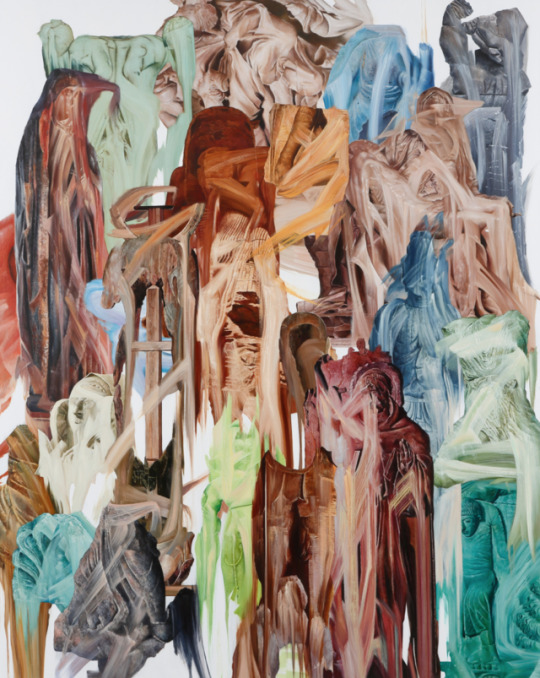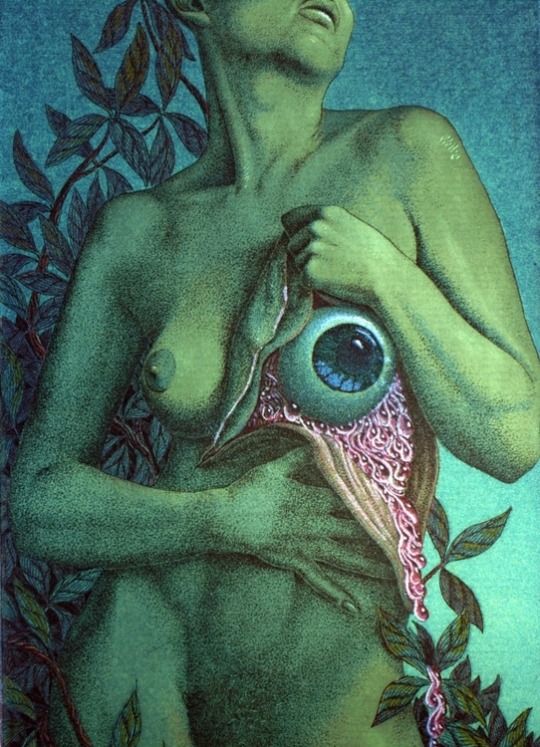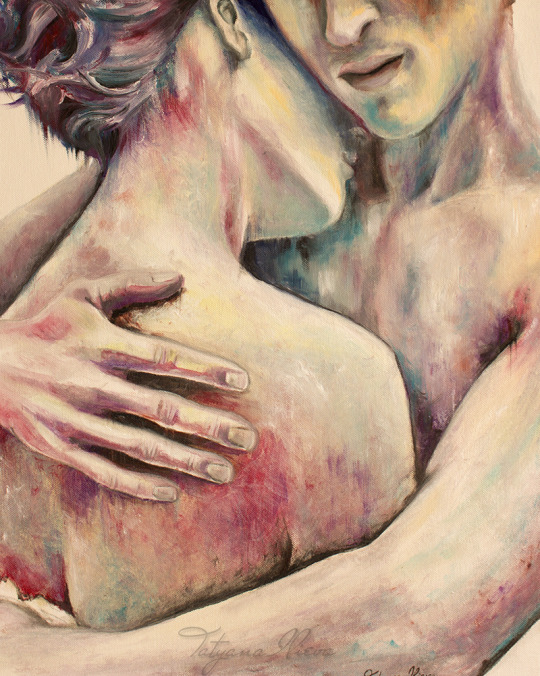Text
my right to die or: how i learned to stop worrying and love euthanasia
I rarely post anything personal here, I prefer to re-blog stuff about artistic works and Marxism but I feel like it’s important I get my thoughts out there on this subject: the right to die and mental illness. I will address large issues with America’s relationship with euthanasia as well as how they affect me personally.
American society has a problematic relationship both with it’s views on end of life care and mental illness. It’s at times expected for people to prolong their life as long as possible. Conversations about death are quickly shut up around “polite company.” Sick parents comfort crying children who tell their parents lines about always needing them, that they can’t help but see themselves as the child they once were still needing their parent’s guidance at times, though they themselves could be in their late forties and fifties. This isn’t to say that the loss of a parent isn’t something traumatic to someone, that they aren’t often times losing their most important role-model, but rather this is to highlight the societal pressure which manifests itself in familial expectations on how long someone should live.
A study published in Ageing and Society discussed a survey of 1600 participants with an average age of 42 and a slightly higher than average level of educational achievement found the single largest factor in people answering positively to questions like “do you want to live past 80?” was their expectations on quality of their final years. People who expected to have relatively healthy and financially secure life when reaching 80 years of age wanted to live longer, some past 100 years. Minority raced and people who identify as religious tended to want to live to or past 80.
In order for the average person to reach 80 years old they’ll generally have to receive expensive, and at times, painful, treatment towards the end of their life. American’s spend on average of $316,600 in their lifetime on medicine with half of that money being in their senior years, even more so if they make it past the age of 85.
My family carries a rare gene which triggers Lou Gehrig’s disease. I have seen my grandmother, cousins, great aunts and uncles die a, usually, slow and painful death. In the past 5 years there’s been too many to count, I think like 8 people in total, with more when you look back generations. More of my relatives carry the gene which triggers the disease, but knowing you carry the gene doesn’t tell you if you will develop ALS or when it will hit or how quickly it will take over your body. I do not know if I carry the gene because I cannot be tested unless my mother is, it would be a breach of her privacy for me to be tested. After ALS progresses typically your lungs stop working and you end up suffocating. With modern life support technology you can be kept alive in a conscious though vegetative-like state indefinitely, an option my grandmother, the most stubborn person in all of Minnesota history chose to do for sometime, like three years or so.
Seeing so many people die such a death you would think my family would have developed the skills to speak earnestly and openly about death but that just hasn’t been the case.
There has been a push among healthcare providers to have elderly patients file an advance care directive or living will with them in order to be sure that the health workers and patients are all on the same page as far as end of life care is concerned. A key point missing from many of these conversations is the option of euthanasia or assisted suicide. Currently assisted suicide is only legal in Oregon, Washington, California, Colorado, Vermont, Montana, and D.C. though, the option of withholding healthcare is almost always an option, such as do no resuscitate orders in people’s end of life plans.
Oregon was the first place in the country, and one of first places in the world, to allow doctors to prescribe a lethal amount of a drug, though not deliver the dose themselves to the patient. There is a documentary named How To Die In Oregon which follows an organization which assists people who have chosen to die after being diagnosed with a terminal illness. The film includes interviews with volunteers from the organization, patients, healthcare workers, family of those about to die, and even includes footage of the patients dying.
Belgium may have the most just and fair euthanasia laws in the world. Belgium allows for so called non-terminal patients as well as children to request physician assisted suicide. There are roughly 1400 assisted suicides preformed each year in Belgium for non-terminal (nearly always people suffering from non-treatable mental illness).
The laws and culture of Belgium regarding euthanasia is a great step forward for humanity. There can be no freedom without the freedom to control one’s own death. These laws don’t simply address the ability to have a say in one’s own death but also allows for an honest discussion on quality of life.
Most mental illnesses are treatable diseases that, like other diseases, can be addressed simply and effectively, coming in phases, sometimes for no reason, sometimes triggered by life events. With proper medical treatment the sufferer can find relief, or get their disease treated to a point where it is possible to live a full and fulfilling life despite it, typically with some combination of pharmaceuticals and talk therapy.
Some cases of mental illness are not like this though. Select cases do not come and go as episodes, rather constantly present in a severely debilitating way. My mental health problems are like this.
I have rarely felt happiness in my life. I have suffered from major depression and dysthymia, a combination sometimes called double depression, for my entire life. I do not remember a point in my life where these problems were not present, as far back as one can really remember. Simply waking up and going to school was an unbearable pain and burden my whole childhood. 9th grade year of high school I missed over 100 days of school.
I have used a variety of treatments my whole life. We would try one prescription for a while with little results then either adjust it or move onto the next one. I had pushed a psychiatrist to preform ECT on me when I was around 18 which resulted in my mother and the doctor shouting at each other, completely turning me off of that facility, the largest healthcare provider in the area. Then six months ago after a failed suicide attempt a doctor suggested ECT and we proceeded. For a while I did actually feel something resembling happiness because of the treatment but that faded and I fell back into the same slump I am so used to being in.
I found comfort in partying, never becoming dependent on drugs as others around me did, but had heavy use of them. Starting at 14 or so I had moved on from simply smoking pot to doing cocaine, drinking, smoking meth, nearly every common drug one can think of I put it inside my body. Thankfully though I had the ability to compartmentalize the drug use as simply for partying, while close friends could not. I, at times, feel responsible for two of my childhood best friends drug additions which they still wrestle with years after I introduced them to those particular drugs. For whatever reason I assumed others had the ability to be able to get really fucked up on whatever we had around and be able to walk away from those drugs just as easily. I have had to end those friendships because of the guilt I feel.
Then at 19 things got even worse. I was at a point where I was getting messed up, typically drunk, three or four days a week. I would go out with my friends at 10 pm and wouldn’t stop partying until 7-8 am, get a couple hours of sleep then do it all again the next day. I had been doing this for nearly two years. We lived only a few blocks from my college in a part of the city which was full of students. We had our own little community there, everyone knew everyone, parties almost always had an open door policy so long as you were cool.
It all changed one night where I was drinking with my friends. We were roughly half a block from our apartment, bottles of liquor in hand, it was around 4 am at this point. We see cops approach us and did what we had done so many times before and split and take off running as quickly as possible. We weren’t really concerned with tickets for minor consumption or open bottles, rather simply enjoyed the thrill of running from the cops. For reasons I still don’t know the cop decided to ignore my friends and go for me. They caught up with me tackled me to the ground, through the handcuffs on me in no time at all and proceeded to kick and punch me leaving my whole body badly beaten, bruised, and bloody. Arriving at jail their torture only continued, more beatings, being dragged by my hair. It climaxed when I was being finger printed, all the liquor I had had that night decided it was done being in my stomach, and I ended up throwing up on myself, the finger printing machine, and the cop doing my finger printing. They put me in a choke hold, drug me to my cell, stripped me naked while yelling homophobic slurs at me, and forcibly gave me an anal cavity search. I was not able to sit down for over a week after that.
After leaving jail on bail I prepared a cocktail of drugs, consumed them with a shot of whiskey, turned on some music and waited to drift off. The next day I woke up feeling absolutely awful, with yellow skin, and vomit all over me. This was by no means my first or last suicide attempt.
Thankfully the judge on my case was sympathetic to the abuse I received in custody, as well as respecting my relatively clean police record and was basically given a slap on the wrist.
The whole ordeal left me with PTSD. I cannot be around police. I’ve developed a spidey sense where I can feel when a cop is near and act in a way which will minimize any possibility of interacting with police. I have been on medications since then for treating the nightmares that I have from them, making it easier to sleep through them. I doubt that the PTSD will ever get to a point where I can function normally around police though.
All of this is to say my mental health is fucked. My medical bills have completely destroyed any hope for having a financially secure future. I can sometimes do extremely well in college despite my issues and at times have to drop out because of them. I have never made it more than three consecutive semesters without needing to stop because of my mental health. I haven’t gone more than a few weeks without some form of suicide attempt or self harm since I was nearly 13.
After I finish this post I will be walking to the store to pick up a box of razors and slicing my arms open and hopefully going deep enough to bleed to death. For some reason I have really come to like the idea of killing myself through cutting my wrists, it’s just always been the method I’ve had in mind when dying. I have used other methods, some which are generally more effective than my preferred method, without success.
Many doctors have said that it’s possible I will never live a life resembling normal because of my mental health problems and it’s treatment resistant nature. This is not a life that is worth living. My inability to feel happiness, to get myself out of bed, to feed myself, why is it I’m forced through societal norms to continue this life?
It should be my right to sit down with a doctor and explain the pain I have experienced my whole life, have them review the extensive medical history, and allow me to die in such a way that is painless and allows for me to die surrounded by my friends and family. But because it is not currently possible I am forced to use violent, painful methods to take my own life while I’m alone. I want to be able to close my eyes for the last time after seeing my family in the same room.
I fully understand the consequences of death, that there is no returning, and in my opinion, nothing on the other side. This is fine with me. Please understand that a life like this is not a life worth living and please support local initiatives which help those in deciding what their final moments will be like. Death is a part of life and one the person experiencing it should have total control over.
7 notes
·
View notes
Photo

Chrissy Angliker (Swiss, b. Zurich, Switzerland, based Brooklyn, NY, USA) - Home Stretch, 2015 Paintings: Acrylic on Canvas
2K notes
·
View notes
Photo









Once you enter Mrs. Pepper Design’s world, your wall space will never be the same. Shop her amazing creatures: http://cur.im/2p0eIfz
🌟Order now for Free WORLDWIDE Shipping!
212 notes
·
View notes
Photo









Kei Imazu, Paintings.
Wondrous, distorted re-workings of classical paintings, statues and architecture by Japanese artist Kei Imazu.
Don’t miss Supersonic Art on Instagram!
Keep reading
519 notes
·
View notes
Photo

From the collection, “Seven Nights” by Jorgen Boberg (1977)
7K notes
·
View notes
Photo

Kim Dorland (Canadian, b. 1974), Dead Tree, 2010. Watercolour, 106.7 × 74.9 cm.
162 notes
·
View notes














